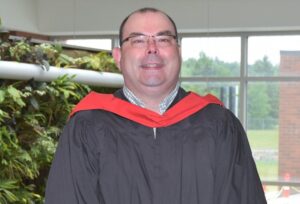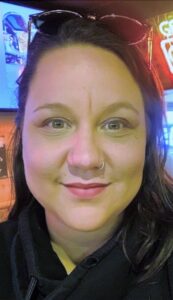Indigenous changemakers recognized by Nipissing University

By Kelly Anne Smith
NORTH BAY — Excellence in teaching and learning Indigenous education has been awarded at Nipissing University. During the convocation ceremony on June 15, Dr. Jonathan Pitt and Nicole Abotossaway were recognized with top awards.
Dr. Pitt is the 2023 recipient of the Chancellor’s Award for Excellence in Teaching [Contract Academic Staff Bargaining Unit (CASBU)].
The CASBU award was established to recognize contract academic faculty members with an outstanding record of exceptional teaching and who play a significant role in the education of Nipissing University students. Teaching in the Department of Gender Equality and Social Justice, Erin Dokis (Dokis/Nipissing First Nation) won the prestigious award in 2022.
An educator for over 20 years, Dr. Pitt teaches in the Schulich School of Education in the mainstream B.Ed., Indigenous Teacher Education Program (ITEP), and Teacher of Indigenous Languages as a Second Language Program (TILSL), the Faculty of Arts & Science in Indigenous Studies, and the K-12 environment.
Dr. Pitt has Haudenosaunee and Anishinabek roots from First Nations in Quebec. He resides on the traditional territories of Nbisiing (North Bay) and Aundeck Omni Kaning First Nation. He feels honoured to be receiving recognition with the Chancellor’s Award for Excellence in Teaching (CASBU).
“It’s a representation of all of our knowledge. I think of my ancestors that have come before me – that gets passed down to us through our blood memory. That gets shared with them in my heart.”
The educator gives full credit to the students and his colleagues.
“I couldn’t have done it without the students that I’ve had. Most of my students predominately have been Indigenous students in Indigenous Studies and Indigenous Teacher Education. We have a number of really good First Nation and Indigenous faculty to give you that sense of community to help you to grow. I think that as institutions start to decolonize and move through those processes of Indigenization – that’s the term used in contemporary literature – as institutions work to make their places better for Indigenous students and Indigenous faculty and staff, you have to have that critical mass of Indigenous faculty.”
Pitt says that will help to bring knowledge forward.
“Knowledge is like water. I’ve heard different Indigenous Knowledge Keepers talk about our knowledge system. It’s like water and everybody carries drops. Everybody carries part of it so it’s fluid,” he says. “As we get more people together, we get to exchange and share those ideas, which is what is so lovely about the courses that I teach. I get Indigenous students from all over Turtle Island coming together and sharing often knowledge that is specific to geographic place or different locations.”
The professor calls on us to value difference and things that are not always conforming to one way of thinking.
“We are not a monolith Indigenous People. We give different perspectives and that’s essentially what our communities were. A lot of our communities were matriarchal prior to first contact. A lot of those ideas that were shared within our communities, that’s what moved us forward. It wasn’t the Indian Act Chief and Council system that we had imposed on us,” Pitt explains. “We are not homogeneous… All Indigenous People across Turtle Island are unique. We’ve got so many different languages that we are trying to revitalize. We have so many dialects. You can tell what community someone is from, even what part of a community someone is from based upon dialects.”
Pitt is gearing up for the Indigenous Teacher Education programs that start up in early July at Nipissing University.
“There’s something really special and beautiful in those courses because we have students in places like Fort Albany. We also have students from Six Nations who come together. We have students who are from a variety of locations of First Nations.”
Pitt says they will be out on the land studying topics through an Indigenous lens such as wellness, identity, culture, and spirituality.
“We usually start with a medicine circle teaching. I don’t use wheel because that is more colonial…how it relates to our culture, our identity, any language connections that we have, how it fits in with the wellness or well-being lens. We also look at it from the perspective of practicality and utility, our histories and looking at through our understanding.”
Dr. Pitt will continue walking on his path and making a difference.
“I was hungry to learn from my Elders, and learn from our knowledge carriers and language carriers. I really pushed myself and ask, ‘Did I make a difference?’ Because for so long, a lot of people have hid their identities. There’s been a lot of racism. Only in very, very, very recent memory that it started to dissipate. It’s still there, but it is more subtle than it is overt.”

for her exceptional achievement with the highest academic standing from the Faculty of Education and Professional Studies/Schulich School of Education. – Photo supplied
Nipissing University also recognized Nicole Abotossaway for what Dr. Pitt described as extraordinary Anishinabek academic excellence.
A member of Aundeck Omni Kaning First Nation, Abotossaway is the 2023 recipient of the Governor General Award for her exceptional achievement with the highest academic standing from the Faculty of Education and Professional Studies/Schulich School of Education.
Abotossaway is also the recipient of the President’s Gold Medal for the Master of Education Degree, which is awarded to students graduating with the highest academic average in all courses in each degree program.
She is also a part-time professor teaching in the Indigenous Classroom Assistant Diploma Program at Nipissing University. Award recipient, educator, and exceptional student, Nicole Abotossaway has a message for the world.
“No matter what, always follow your educational dreams. My ancestors walk with me, I share these academic gold medal awards with my late-parents, my first teachers. I’m honoured to win both gold medals. It is special to win the Governor General’s Gold Medal as Mary Simon now holds that role. She’s Inuk, making her the first Indigenous person to hold the office,” she expresses. “My immediate family were my support throughout the Masters Degree journey. I’m still waiting to hear if my home First Nation community of Aundeck Omni Kaning will support me to pursue my doctoral degree. I have been accepted but will require their support to continue my studies.”

